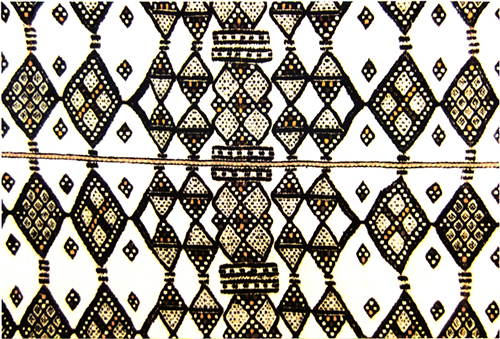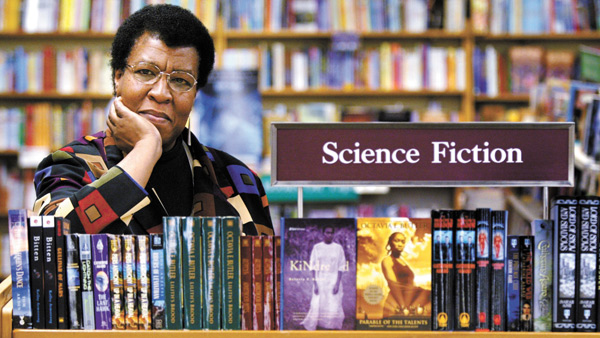
Blog (2008-2018)
MUDD UP BOOK CLUB: ALIF THE UNSEEN & RITA INDIANA
The Mudd Up Book Clubb exists increasingly offline, but I shouldn’t let us flesh-and-blood meetup ghosts have all the syllabi, so — time to announce our next two selections, novels by Rita Indiana Hernandez (yes, that Rita) & G. Willow Wilson.

The Mudd Up Book Clubb’s first selection of 2013 is G. Willow Wilson’s remarkable debut novel, Alif the Unseen. Hack3rz & djinn & a white american lady called ‘the Convert’ suspensing through a composite Emirati city contemporary with Arab Spring. Allah-ex-machinas abound but Alif is much more about the ideas and well-observed societal nuances than any action. Gender relations and visibility, class striations defining urban space, the liturgical music of the djinn… Plus there’s a lot in here about coding, computer languages, spirituality, and control — very much in line with Sufi Plug Ins, not to mention the Clubb’s occasional subtheme of old school Islamic geomancy.
Wilson, like one of her characters, is a white american who converted to Islam and lived in the Middle East for awhile. The world is big; I hope this gets translated into Arabic.
We’ll meet in Manhattan on Sunday Feb 3rd to talk Alif The Unseen.
*

And I’m very excited to say that in late March we’ll read the second novel of Dominican superhero, Rita Indiana Hernandez. Papi is written in Spanish. We got enough Spanish-language readers in the clubb that I figured it’d be fun to do this.
I see your Junot and raise you a Rita. For real. Rita is a brilliant force; if you’re unfamiliar with her music, check out the El Juidero vid below, or read this breathless-but-its-true! introduction post I wrote back in 2010 when I released her first single, a few months before she signed to a major label.
Juan Duchesne Winter describes Papi: “Una niña espera y espera a su padre hasta el delirio, Papi no falla en aparecer. Aparece y reaparece, repitiéndose sin pudor, encarnadno el neomacho global de los trópicos. . . narrada en prosa que inocula el ritmo del perico ripiao en el pulso tecno, que inyecta la bachata en la sonata.” (I wonder if Juan Pablo Villalobos read Papi?)
Alif is the only book club selection which you can buy in mainstreamy bookstores (I saw it in Penn Station the other day) and Rita is the only book club author whose (musical) output every Dominican in NYC has an opinion on. Yet few who found about her through the music have experienced her literature — so let’s change that. Dos mil trece!
Keep these books burning.

Fractals
frac·tal // noun, Mathematics, Physics // a geometrical or physical structure having an irregular or fragmented shape at all scales of measurement between a greatest and smallest scale… [^]
This came up at the most recent Mudd Up! Book Club, which led me to looking up this, which led me to the video below. Don’t like the way dude says “singing and dancing” near the end, and a couple other small things (and the way he looks at me) but otherwise fux wit it.
[youtube]http://www.youtube.com/watch?v=7n36qV4Lk94[/youtube]
Patrik OuÅ™ednÃk’s Europeana
[originally posted at Mudd Up]

This month’s Mudd Up Book Clubb selection is Patrik OuÅ™ednÃk’s Europeana: A Brief History of the Twentieth Century, and we’re meeting next Sunday, September 16, to talk about it.
Europeana is a brilliant, simple/sly/hypnotic little book, which of course isn’t simple at all, so few things are. Rather incredibly, the New York Public Library files this book in the History section, which gives the Czech writer’s work even more weight.
OuÅ™ednÃk offers some generous reflections on his work in this interview:
Does the brevity of this novel suggest that we try to remove ourselves from the twentieth century and its horrors, or were you trying to illustrate the absurdity of this past century?
OuÅ™ednÃk – I could simplify this: what were the key words of the twentieth century? Undoubtedly, haste (rather than â€chaos,†which is no more appropriate to the twentieth century than to any another). This meant, let’s try to write a hurried text. Another peculiarity of the twentieth century, I think, is infantilism — with everything that it implies, from the romantic-commercial image of juvenility to the refusal of taking the full responsibility of one’s acts and words. Let’s try then to write a childish text, a text that could have been told by a kid reciting his lesson or by the village idiot. Thirdly, this century has been explicitly scientific. This meant, let’s use a vocabulary more or less scientific, with all its contradictions and, if possible, with all its vacuity. These are the elements that gave birth to the form and content of the book.
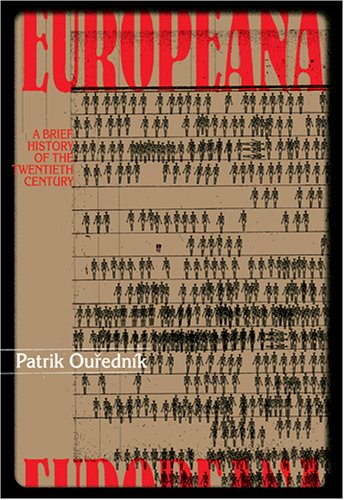
Here’s an excerpt from the first two paragraphs:
The Americans who fell in Normandy in 1944 were tall men measuring 173 centimeters on average, and if they were laid head to foot they would measure 38 kilometers. The Germans were tall too, while the tallest of all were the Senegalese fusiliers in the First World War who measured 176 centimeters, and so they were sent into battle on the front lines in order to scare the Germans. It was said of the First World War that people in it fell like seeds and the Russian Communists later calculated how much fertilizer a square kilometer of corpses would yield and how much they would save on expensive foreign fertilizers if they used the corpses of traitors and criminals instead of manure. And the English invented the tank and the Germans invented gas, which was known as yperite because the Germans first used it near the town of Ypres, although apparently that was not true, and it was also called mustard because it stung the nose like Dijon mustard, and that was apparently true, and some soldiers who returned home after the war did not want to eat Dijon mustard again. The First World War was known as an imperialist war because the Germans felt that other countries were prejudiced against them and did not want to let them become a world power and fulfill some historical mission. And most people in Europe, Germany, Austria, France, Serbia, Bulgaria, etc., believed it to be a necessary and just war which would bring peace to the world. And many people believed that the war would revive those virtues that the modern industrial world has forced into the background, such as love of one’s country, courage, and self-sacrifice. And poor people looked forward to riding in the train and country folk looked forward to seeing big cities and phoning the district post office to dictate a telegram to their wives, I’M FINE, HOPE YOU ARE TOO. The generals looked forward to being in the newspapers, and people from national minorities were pleased that they would be sharing the war with people who spoke without an accent and that they would be singing marching songs and jolly popular ditties with them. And everyone thought they’d be home in time for the grape harvest or at least by Christmas.
Some historians subsequently said that the twentieth century actually started in 1914, when war broke out, because it was the first war in history in which so many countries took park, in which so many people died and in which airships and airplanes flew and bombarded the rear and towns and civilians, and submarines sunk ships and artillery could lob shells ten or twelve kilometers. And the Germans invented gas and the English invented tanks and scientists discovered isotopes and the general theory of relativity, according to which nothing was metaphysical, but relative. And when the Senegalese fusiliers first saw an airplane they thought it was a tame bird and one of the Senegalese soldiers cut a lump of flesh from a dead horse and threw it as far as he could in order to lure it away. And the soldiers wore green and camouflage uniforms because they did not want the enemy to see them, which was modern at the time because in previous wars soldiers had worn brightly-colored uniforms in order to be visible from afar. And airships and airplanes flew through the sky and the horses were terribly frightened.
In the margins on nearly every page there are incredible subheadings written in tiny grey type, for example the above selection contains the subheadings THE ENGLISH INVENTED THE TANK and MARCHING SONGS and GERMANS INVENTED GAS. Europeana! You’re in for a treat.
+ + +
Here’s the Mudd Up Book Clubb reading list (you join by recommending a book) in reverse chronological order:
Patrik OuÅ™ednÃk, Europeana
Nalo Hopkinson, Midnight Robber
Michael Taussig, My Cocaine Museum
Tatyana Tolystaya, The Slynx
Augusto Moterroso, Mister Taylor
Vladimir Sorokin, Ice Trilogy
Lauren Beukes, Zoo City
Samuel R. Delany, Times Square Red, Times Square Blue
Juan Goytisolo, Exiled from Everywhere
Cesar Aira, How I Became a Nun
Maureen F. McHugh, Nekropolis
CARNIVAL ON A CARIBBEAN COLONIZED PLANET
I’m a fan of judging books by their covers. Check this one out:
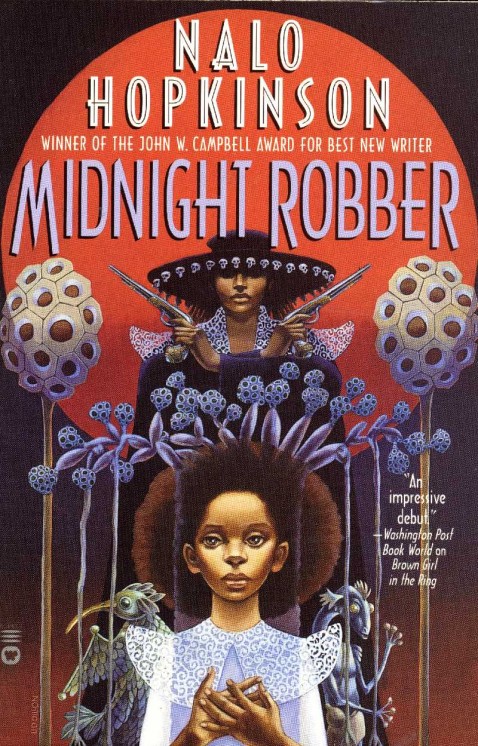
Awesome, right?
Our August Mudd Up Book Clubb selection is Nalo Hopkinson’s Midnight Robber. The novel kicks off during Carnival on a Caribbean colonized planet, where the AIs speak patois, and expands from there.
Folklore from Hopkinson’s native Caribbean meshes with a mind-expanding take on African diasporic technologies, issues of gender and sexual abuse, themes of exile and utopia and lawlessness, all written in a Creole-laced language whose musicality is a delight. Yuh see mi a say? Like Octavia Bulter, another Clubb favorite, Hopkinson renders a complex black woman protagonist at the heart of a tale that manages to be badass, weird-with-possibility, and filled with empathy even at its most harrowing.
Plus, let’s face it, we listen to a lot of music from the Caribbean but rarely do we read novels that spring from, engage, and extend that tradition. So–
Midnight Robber. We’ll meet in Manhattan on Sunday August 12th to chat about the book then go eat some doubles. (you join the Mudd Up Book Clubb by recommending a book).
+ + +

[Nalo Hopkinson, December 2011]
“She had was to learn, she had was to come to consciousness. Them days there, the programmers and them had write she protocols in Eleggua, seen — the code them invite to write programmes to create artificial intelligence?”
“Yes, me know.” Old-time story. Antonio sipped at the rum he’d brought to share with the Obi-Be’s son… – Midnight Robber
My Sufi Plug Ins project was underway when I read this book last year, but there was serious inspiration to be found, both in her approach to technology and in the role that language(as-interface) plays in the book’s writing itself as well as in the technologies depicted within it. Here are two interview excerpts where Nalo Hopkinson discusses these issues in Midnight Robber:
“So many of our stories about technology and our paradigms for it refer to Greek and Roman myth and language: we name rocket ships ‘Apollo’ and communication devices ‘telephone,’ a human-machine interface a ‘cyborg.’ It shapes not only the names for the technology we create, but the type of technology we create. I wondered what technologies a largely African diasporic culture might build, what stories its people might tell itself about technology. So a communication device that sees and hears becomes a ‘four-eye;’ literally, a seer. The artificial intelligence that safeguards all the people in a planetary system becomes Granny Nanny, named after the revolutionary and magic worker who won independent rule in Jamaica for the Maroons who had run away from slavery. Rather than being a ‘Big Brother’ paradigm it is an affectionate reference to her sense of love, care, and duty. The operating system that runs a dwelling is an ‘eshu,’ named after the West African deity who can be in all places at once, who is the ghost in the machine.”
“I grew up in a Caribbean literary community. It is perfectly acceptable there to write narrative and dialogue in the vernacular. It’s not that difficult to understand. I was interested in the way that Creoles can be accorded the full status of languages. The Creoles in this novel are the formal, written form of the language of the people in it. And the language shapes thought. If I had written Midnight Robber completely in English Standard, it would have had a very different feel and rhythm. I could say ‘Carnival revelry,’ but it wouldn’t convey movement, sound, joy the same way that ‘ring-bang ruction’ does.”
+ + +
Here’s the Mudd Up Book Clubb reading list – it’s been going for over a year now — in reverse chronological order:
Nalo Hopkinson, Midnight Robber
Michael Taussig, My Cocaine Museum
Tatyana Tolystaya, The Slynx
Augusto Moterroso, Mister Taylor
Vladimir Sorokin, Ice Trilogy
Lauren Beukes, Zoo City
Samuel R. Delany, Times Square Red, Times Square Blue
Juan Goytisolo, Exiled from Everywhere
Cesar Aira, How I Became a Nun
Maureen F. McHugh, Nekropolis
+ + +
& dont’ forget the Nalo Kindle-formatted screensaver!

OUR COCAINE MUSEUM
The last Mudd Up Book Clubb meetup was the most special to date, as The Slynx’s author Tatyana Tolystaya herself showed up unexpectedly. Translator Jamey Gambrell was able to join us as well. INCREDIBLE. To discuss one of my favorite books with its author & translator was a rare treat.
+ + +

[Taussig in a garden with yagé vines with Don Pedro, an Indian healer. Colombia, 1977. Via Cabinet.]
Our next selection is Michael Taussig’s My Cocaine Museum. Stoned anthropology written as a slide through heat & sensation in the shadow of Walter Benjamin. Thinking about gold, cocaine, slavery, boredom, color, history, centered around Afro-Colombian gold miners on Colombia’s Pacific coast. This is our second nonfiction book so far, and like Delany’s Times Sq Red, Times Sq Blue, the prose is incandescent, challenging and rewarding. Join us, we’ll meet in NYC on July 8th for My Cocaine Museum.
Here’s an excerpt from the beginning of the “A Dog Growls” chapter:
A dog growls in the doorway of the house where I am staying in GaupÃ. I have never heard this dog growl before. I look out into the street, There are two armed soldiers walking by on patrol in standard-issue camouflage. Strange how the dog picks up what most of us feel but do not express. What would happen if we all growled when soldiers walked by? A whole town growling! How wonderfully appropriate to growl back at the state, mimicking it, growl for growl, watching it magnify in the fullness of biological prehistory, writing being but another form of hair rising on the back of the neck. Slap up against the wall of the forest, you get an acute sense of the thing called the state. To me this is more than a heightening of contradiction exposing something hidden. I think of it as natural history, the natural history of the state.
Writing is sixth sense, what dogs are supposed to have, same as what filled the space between the words.
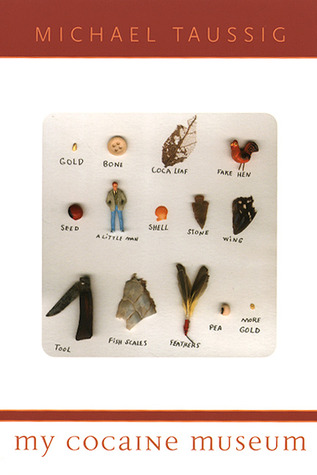
The first place I ever DJed cumbia was at Taussig’s place in upstate New York (a good friend was getting married – wedding DJ!). It wasn’t until a year or two later when I stumbled across all these lovely tracks from the Rio Timbiqui area of Colombia which he writes about so richly in My Cocaine Museum.
A laptop theft took those tunes out of my hands again, but here’s a related song. “I don’t want it” by Grupo Gualajo – a gorgeous marimba jam about foreigners coming to Pacific Colombia to spirit away “our music, our records, and tales of our ancestors / they arrive happy back home / because they took all our inspiration / we don’t value what we have / others come and take the best…”
[audio:http://negrophonic.com/mp3/Grupo_Gualajo-No_Quiero-www.negrophonic.com.mp3]Grupo Gualajo – No Quiero (from the Afritanga comp)
THE SLYYYYYYYNNNNNNNNXXXXXXXXXXX
[originally posted at Mudd Up!]

[ТатьÑÌна ÐикиÌтична ТолÑтаÌÑ]
For this month’s Mudd Up Book Clubb, we have a very special selection — Tatyana Tolstaya’s The Slynx. It is the only novel I’ve ever read which is both laugh-out-loud funny *and* has given me nightmares. Amazing.
Some people call it a dystopia, and true – The Slynx does take place in Moscow about 200 years after an unspecified Blast has knocked everyone back to Stone Age level amenities – but Tolstaya’s prose is luminous, alive, bursting with a belief in language’s power to create worlds, which is precisely what this book does. Textual pleasures surround the tale of a quasi-literate copyist in the era of Degenerators…
What is The Slynx concerned with? Food, catastrophe, body jokes, gorgeous prose, xerox machines after the apocalypse, social hierarchies, books, melted canonicity, mice-as-currency, etc.
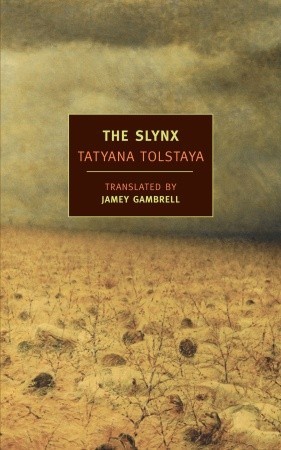
You might recognize the translator, Jamey Gambrell, from a previous book clubb selection, Vladimir Sorokin’s Ice Trilogy. Her Slynx translation is another impressive work, as the novel is peppered with malapropisms, mutant references to Russian literature, and conversations in a range of voices. These two novels are some of the best I’ve read in a long time, but I should mention that Sorokin and Tolstaya are extremely different writers; all the more power to Gambrell for articulating each into English with such elegant specificity. (While we’re talking translators, tune in to last Wednesday’s Mudd Up! for a special show with Arabic literature translator Humphrey Davies, recorded in Cairo).
The Mudd Up Book Clubb will meet on Sunday May 27th at 5pm for lively discussion followed by micemeat pies.
Here’s an excerpt from the opening pages:
Benedikt pulled on his felt boots, stomped his feet to get the fit right, checked the damper on the stove, brushed the bread crumbs onto the floor–for the mice–wedged a rag in the window to keep out the cold, stepped out the door, and breathed the pure, frosty air in through his nostrils. Ah, what a day! The night’s storm had passed, the snow gleamed all white and fancy, the sky was turning blue, and the high elfir trees stood still. Black rabbits flitted from treetop to treetop. Benedikt stood squinting, his reddish beard tilted upward, watching the rabbits. If only he could down a couple–for a new cap. But he didn’t have a stone.
It would be nice to have the meat, too. Mice, mice, and more mice–he was fed up with them.
Give black rabbit meat a good soaking, bring it to boil seven times, set it in the sun for a week or two, then steam it in the oven–and it won’t kill you.
That is, if you catch a female. Because the male, boiled or not, it doesn’t matter. People didn’t used to know this, they were hungry and ate the males too. But now they know: if you eat the males you’ll be stuck with a wheezing and a gurgling in your chest the rest of your life. Your legs will wither. Thick black hairs will grow like crazy out of your ears and you’ll stink to high heaven.
Benedikt sighed: time for work.
MUDD UP BOOK CLUBB: AUGUSTO MONTERROSO MARCH EDITION
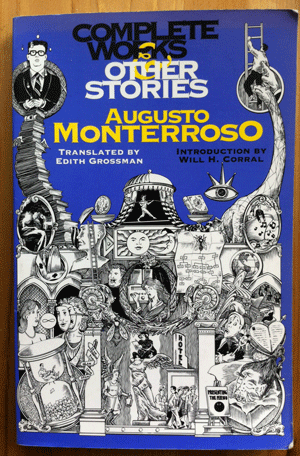
Announcing a short-notice edition of the Mudd Up Book Clubb.
We are meeting this Sunday, March 24rd, to discuss Augusto Monterroso’s short story “Mister Taylor.â€
Those unfamiliar with the Guatemalan writer who lived most of his life in Mexico City are in for a treat! Monterroso’s agile and darkly comic meditations on “resource extraction,” colonial mentality, distribution chains, citizen-hostile bureaucracy, and the impact of North American appetites on life in Latin America pack as much of a multilayered punch now as they did when “Mister Taylor” was first published, sixty years ago. Nuanced and outrageous.
Here’s the first sentence, from Edith Grossman’s pitch-perfect translation:
“Somewhat less strange, though surely more exemplary,†the other man said, “is the story of Mr. Percy Taylor, a headhunter in the Amazon jungle.â€
The original Spanish text is online, the English trans. will be provided in advance (it’s a fast read, takes less than 10 minutes), and we’ll meet at 5pm on Sunday in this special short-notice edition… Interested? Join us. Keep it muddy.
MUDD UP BOOK CLUBB: KINDLE SCREENSAVERS
Originally posted at Mudd Up!

I started the Mudd Up Book Clubb as a celebration of books, readers, libraries, IRL meetups, and all the hot people who love slow media. But the biggest thanks of all goes to the writers themselves. Keep us burning! We see you and salute your work. Furthering that end, here is a gift straight from my muddy heart –
Hand-drawn portraits of all the authors we’ve read so far by artist Rocio Rodriguez Salceda, fitted into digitals for maximum spreadability. Each drawing measures 600 x 800 pixels — formatted for Kindle screensavers, but they work well in a variety of situations: say, an iPhone background, a regular screensaver, or a razor & octopus ink tattoo.

Click on each author’s name for the individual JPG, or grab this ZIP file (2 MB) containing all 8 images. (Here’s a detailed guide on how to jailbreak a Kindle).
MUDD UP BOOK CLUBB KINDLE SCREENSAVERS:
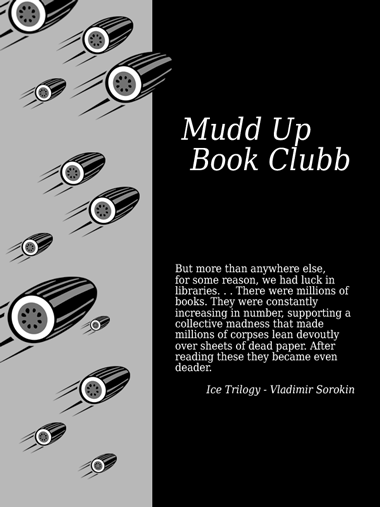


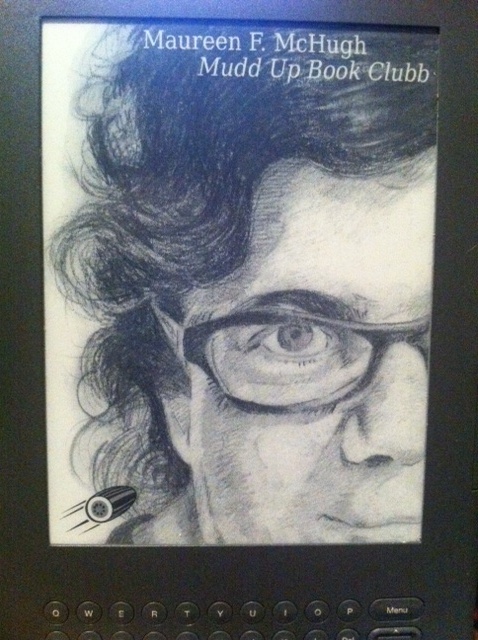

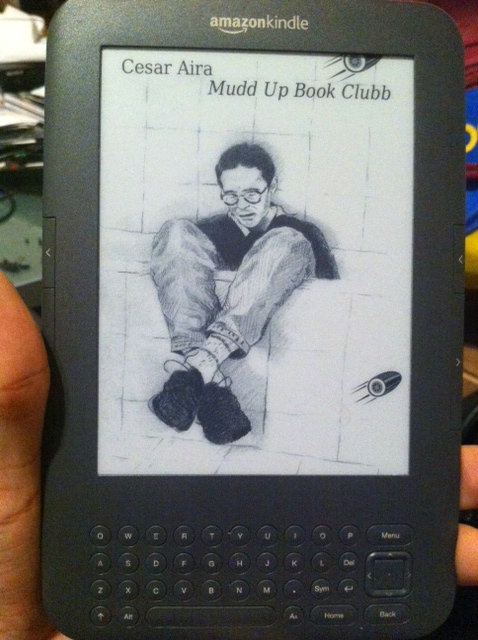

MUDD UP BOOK CLUBB: VLADIMIR SOROKIN – ICE TRILOGY

For the January edition of Mudd Up Book Clubb, we will be reading an epic and incandescent piece of contemporary Russian fiction: Vladimir Sorokin’s Ice Trilogy. It’s ambitious, totally nuts, capable of generating new emotions, perhaps the first “21st Ct” novel I’ve read.
Ice Trilogy is like a joke without the relief of a punchline. I regret recommending it to friends because suddenly I need to explain what it’s about, and end up sounding crazy… The book opens as a 19th century Russian novel. Then comes a trip to Siberia and an encounter with the Ice. It’s best if you read it. Let’s just say that the traditional arc of 20th century history is left intact but superimposed with a much more urgent momentum: the Brothers and Sisters of Light’s search for blond, blue-eyed people to smash in the chest with an Ice hammer, in hopes that the heart inside will awaken, and speak the language of the heart.
Pulpy, “literary”, and unrepentantly other, Ice Trilogy is a book you read with and against, a work that lingers.
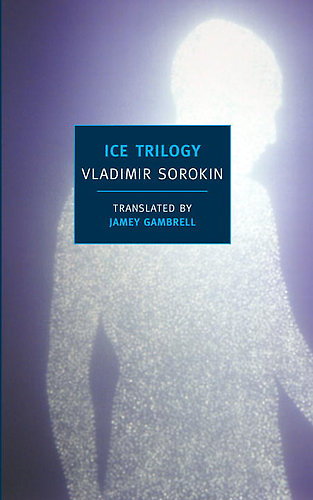
The NYRB translation collects Sorokin’s three books — Bro, Ice, and 23,000 — into a single volume. 700 pages long, and entrancing.
The Mudd Up Book Clubb will meet at 5pm on Sunday January 22nd (TBC) in Manhattan for lively discussion followed by popsicles.
—–
Past Book Clubb selections:
December 2011 NYC: Lauren Beukes Zoo City
November 2011 NYC: Samuel R. Delany Times Square Red, Times Square Blue
September 2011 Tangiers: Juan Goytisolo – Exiled from Everywhere
August 2011: Madrid: Cesar Aira – How I Became a Nun
June 2011: Casablanca: Maureen F. McHugh – Nekropolis
MUDD UP BOOK CLUBB: DECEMBER 11th NYC EDITION
[originally posted at Mudd Up!]
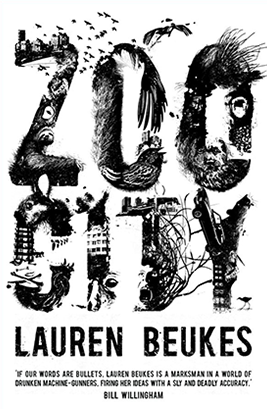
On Sunday December 11, the Mudd Up Book Clubb returns to Manhattan, to discuss Lauren Beukes’ 2010 novel Zoo City. If you wanted to throw genre signifiers at it, you could say that it’s new African urban fantasy sci-fi noir with a strong musical component. There is even an accompanying soundtrack , released on African Dope records:
As I wrote in my August post on Zoo City, “It’s weird noir, set in contemporary Johannesburg, featuring an ex-junkie protagonist named Zinzi December and her magic sloth. The unconventional pair is caught in a web of intrigue involving murder, 419 email scams, and a missing kwaito/afropop teen star. In short, it sounds like a book specifically engineered for my peer group.” Check out the full post for more thoughts on Zoo City, or join us on December 11th in New York City for realtime talk.
—–
Past Book Clubb selections:
November 2011 NYC edition: Samuel R. Delany Times Square Red, Times Square Blue
September 2011 Tangiers edition: Juan Goytisolo – Exiled from Everywhere
August 2011: Madrid edition: Cesar Aira – How I Became a Nun
June 2011: Casablanca edition: Maureen F. McHugh – Nekropolis
MUDD UP BOOK CLUBB: NYC EDITION – SAMUEL DELANY
[originally posted at Mudd Up!]

The Mudd Up Book Clubb marches to Manhattan with a tender, challenging work by one of the most important authors around: Samuel R. Delany’s Times Square Red, Times Square Blue. The book takes Delany’s 30+ years in the porn theaters and gay bars of Times Sq. on the eve of its mid-1990s Disneyification as a grounding point for an extended examination of public space, interclass contact, polymorphous intimate pleasures, the regulation of bodies and behavior, and lots more. Sex & urbanism in Delany’s hands — you can’t go wrong!
The humanity that animates his intelligence is inspiring, as is the deft ease with which Delany flows from frank, considered anecdotes about former lovers & friends to more sociologically-minded writing. Times Square Red, Times Square Blue is built from two long essays, which are themselves quite different: the longer one more personal, the 2nd one more theoretical — it includes a powerful section on contact vs networking that is more relevant now than ever, and uses a two-column layout to play with marginality in a direct way and further shake things up.
This is the Clubb’s first nonfiction selection (not to mention our first selection by a black author), and it will give you a lot to think about. The New York Public Library stocks a handful of copies, including a nonlending one up at the Schomburg. The Manhattan location for this Clubb edition is secret, but suffice to say it’s awesome and will be familiar to those who’ve seen Delany doc The Polymath. The tentative date is November 15th. If you are interested, please join the mailing list.
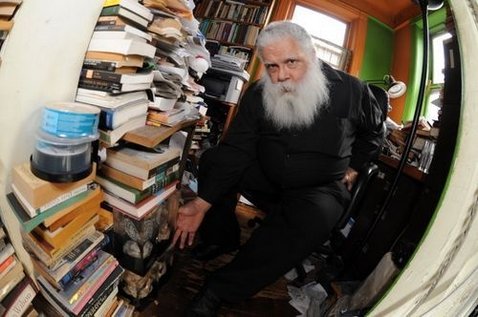
If you only know Delany from his sci-fi or fantasy, then you are in for a real treat! If you don’t know Delany at all, then perhaps short story collection Aye, and Gomorrah or its earlier incarnation, Driftglass, is a good place to start – “The Star Pit” is one of those rare stories that haunts me to no end. (I wouldn’t recommend starting with Dhalgren, only because I know a handful of people who couldn’t get into it and then didn’t investigate Delany any further.)
But Samuel R. Delany’s work has many, many entrances…
OK. Let’s keep those pages turning! For more online reading about this selection, Steve Shaviro wrote an excellent review of Times Square Red, Times Square Blue — indeed, all Steve’s Delany writings are great.
Stay muddy.
MUDD UP BOOK CLUBB: TANGIER EDITION
reposted from Mudd Up!
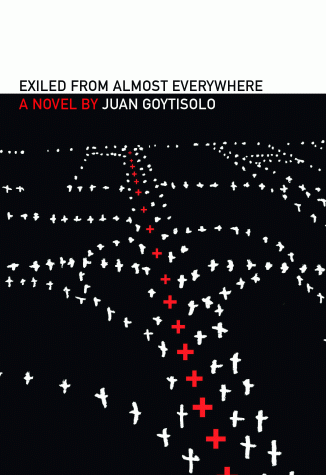
The clubb marches on!
Apologies for the late notice, but the Mudd Up Book Clubb will meet two weeks from today on September 8th, in Tangier Morocco. We’ll be talking about Juan Goytisolo’s Exiled from Almost Everywhere (original title: Exiliado de Aquà y de Allá). Goytisolo is a complicated figure — the Spaniard has lived in Marrakesh for decades, and his biography and attitude are often more interesting than his actual books. But this new one, published after five years of silence, is surprisingly nimble and enjoyable.
The basic plot: a man is blown up in a terrorist attack and finds himself in the afterlife, which is a kind of mad internet cafe. Religious extremism, media spectacles (Debord makes an appearance), the realness of exile (which Goytisolo suffered at the hands of fascist Spain) and the surface-skimming fluidity of online identity, it’s all here. The weird, perversely funny romp of Exiled provides an excellent introduction to the works of this writer. Goytisolo’s career-long literary critique on the cornerstones of Spanish Identity is formidable indeed. (His books were banned in Spain until Franco died in 1975.) I’m not going to pretend that this is an easy or immediately pleasurable read, but it is worth talking about! Plus it’s short. (The October Book Clubb selection will be slightly less far-out, and nonfiction…)
The Guardian review agrees with my take on the book:
Exiled From Almost Everywhere is perhaps the best work of Goytisolo’s later period. The author, who in his 20s, wrote realistic novels that described the vulgar horrors of Franco’s Spain, from which he was exiled, later began to develop a freer, less traditional, more ironic and humorous voice. Nowhere is this style more accomplished than in this novel, beautifully translated into English by Peter Bush. (Even Bush’s title is a clever rendering of the original Spanish, literally “The Exile From Here and There”.)
For more info on the Book Clubb: The idea is simple: every six weeks or so we gather somewhere for informal talk centered around a good muddy book, then go eat delicious food. We’ll have a live Ustream or Skype feed so Cousin Internet and Miss Larry Antitroll can join in — but if you want to tele-participate, you should sign-up for the low-activity Mudd Up Book Clubb Mailing List.
Previous editions: Casablanca / Maureen F. McHugh’s Nektropolis, Madrid / Cesar Aira’s How I Became a Nun.
The following day we are presenting a show at the Cinematheque de Tanger with Nettle and Hassan Wargui/Imanaren. As we mentioned in the Beyond Digital Morocco :Behind the Scenes video, we view the project as a doorway, and are returning for ten days to keep creating.


